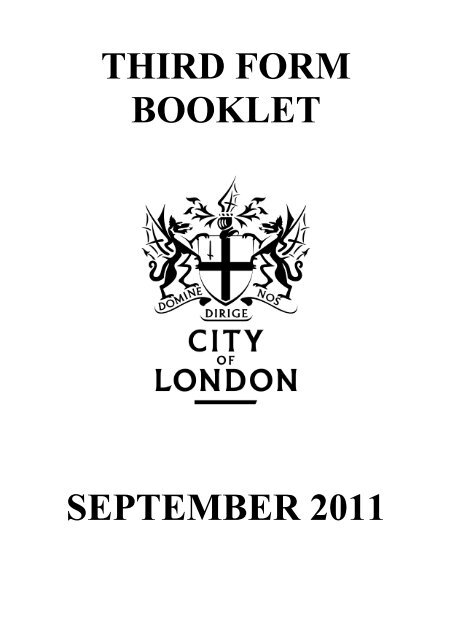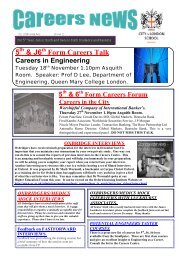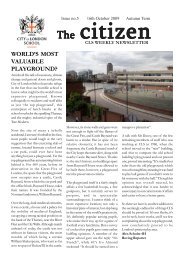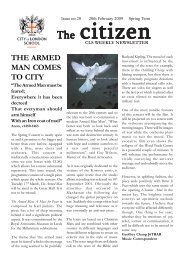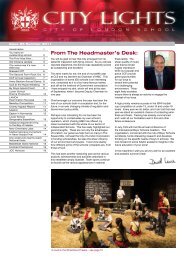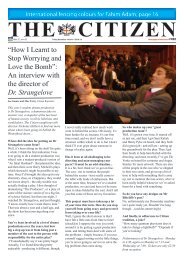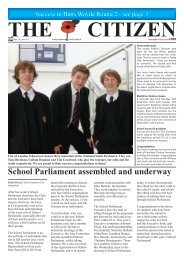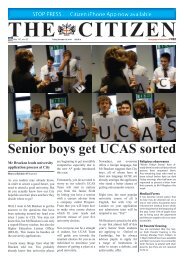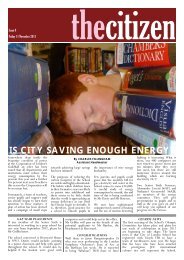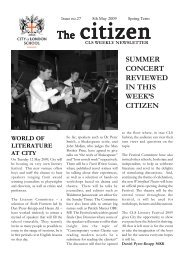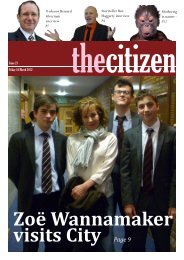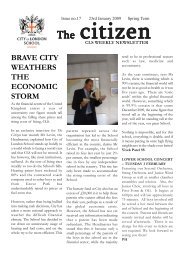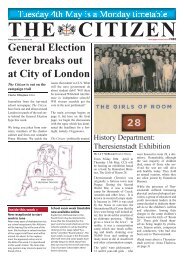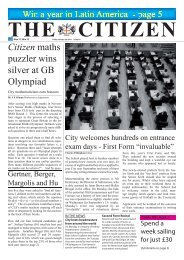third form booklet september 2011 - the City of London School
third form booklet september 2011 - the City of London School
third form booklet september 2011 - the City of London School
Create successful ePaper yourself
Turn your PDF publications into a flip-book with our unique Google optimized e-Paper software.
THIRD FORM<br />
BOOKLET<br />
SEPTEMBER <strong>2011</strong>
INTRODUCTION<br />
This <strong>booklet</strong> is being sent to <strong>the</strong> parents <strong>of</strong> boys in <strong>the</strong> current Second<br />
Form at CLS and to parents <strong>of</strong> those new boys who will be entering <strong>the</strong><br />
<strong>School</strong> at Third Form level in September. In addition to setting out <strong>the</strong><br />
general structure <strong>of</strong> <strong>the</strong> curriculum for <strong>the</strong> Third Form, it also defines <strong>the</strong><br />
intentions <strong>of</strong> <strong>the</strong> various teaching departments for <strong>the</strong> year. However, it is<br />
not intended to be a statement <strong>of</strong> a rigid syllabus. The specific content <strong>of</strong><br />
<strong>the</strong> courses followed will depend, to a certain extent, on <strong>the</strong> responses <strong>of</strong><br />
<strong>the</strong> different groups <strong>of</strong> boys being taught, as well as <strong>the</strong> approach <strong>of</strong> <strong>the</strong><br />
individual teachers. Never<strong>the</strong>less, we hope that you will find <strong>the</strong> <strong>booklet</strong><br />
an in<strong>form</strong>ative guide to <strong>the</strong> type <strong>of</strong> work your son will be covering during<br />
<strong>the</strong> course <strong>of</strong> <strong>the</strong> year.<br />
There are six Third Forms, each under <strong>the</strong> general charge <strong>of</strong> a Form Tutor.<br />
These Forms are pastoral units and also teaching units for most subjects,<br />
though boys are setted for Ma<strong>the</strong>matics and for <strong>the</strong>ir two optional subjects.<br />
Although <strong>the</strong> <strong>form</strong>al Third Form Parents’ Evening is not held until early in<br />
<strong>the</strong> Summer Term, shortly before <strong>the</strong> GCSE options choices are made,<br />
parents are invited to contact <strong>the</strong>ir son’s Form Tutor at any time in <strong>the</strong> year<br />
if <strong>the</strong>y have any queries about <strong>the</strong>ir son’s life at <strong>School</strong>.<br />
There will also be a social evening for Third Form parents, to which you<br />
will be warmly invited, in <strong>the</strong> first half <strong>of</strong> <strong>the</strong> Autumn Term.<br />
Glen P L Farrelly<br />
Head <strong>of</strong> Third Year
THIRD FORM CURRICULUM - SEPTEMBER <strong>2011</strong><br />
1. In addition to <strong>the</strong> core subjects, boys must make two choices from <strong>the</strong> following subjects: Latin<br />
(or Latin & Greek), German, Spanish, Drama, and Classical Civilisation. At least one <strong>of</strong> <strong>the</strong>se<br />
choices must be a language (ancient or modern) and it should be borne in mind that a boy can<br />
only take a GCSE course in any <strong>of</strong> <strong>the</strong> aforementioned languages if he has already studied <strong>the</strong><br />
language in <strong>the</strong> Third Form. We reserve <strong>the</strong> right to recommend to some boys that <strong>the</strong>y only<br />
take two languages. Boys who are particularly able at Latin will be placed in a set which will<br />
be taught both Latin and Greek. We may not be able to meet all choices if some sets become<br />
too full. All boys must also enter a reserve choice on <strong>the</strong> <strong>form</strong> <strong>the</strong>y return.<br />
2. The <strong>School</strong>’s policy is to <strong>of</strong>fer all boys in <strong>the</strong> Third Form as wide a range <strong>of</strong> subjects and<br />
activities as possible. One aim <strong>of</strong> this policy is to enable boys, towards <strong>the</strong> end <strong>of</strong> <strong>the</strong> year, to<br />
make an in<strong>form</strong>ed choice <strong>of</strong> subjects for study to GCSE in <strong>the</strong> Fourth and Fifth Forms. Ano<strong>the</strong>r,<br />
and equally important, aim is to allow <strong>the</strong>m <strong>the</strong> broadest educational experience before <strong>the</strong><br />
demands <strong>of</strong> external examinations impose <strong>the</strong> need for choice.<br />
3. The curriculum, and <strong>the</strong> allocation <strong>of</strong> teaching periods, in <strong>the</strong> Third Form is as follows:<br />
Core Subjects<br />
Ma<strong>the</strong>matics 4<br />
English 4<br />
French 3<br />
History 2<br />
Geography 2<br />
R.E. 2<br />
Design & Visual Arts 2<br />
Science 9 (Chemistry 3, Physics 3, Biology 3)<br />
Music 1<br />
P.E. 1<br />
Games 3<br />
ICT/PHSE 1<br />
plus two <strong>of</strong> <strong>the</strong> following:<br />
German 3 periods<br />
Spanish 3 periods<br />
Latin & Greek 3 periods<br />
Latin 3 periods<br />
Classical Civilisation 3 periods<br />
Drama 3 periods Total: 40<br />
In addition, during <strong>the</strong> course <strong>of</strong> <strong>the</strong> year each Form will make eight visits to places <strong>of</strong> interest in<br />
central <strong>London</strong>.<br />
4. On joining <strong>the</strong> Third Form a boy also joins one <strong>of</strong> <strong>the</strong> six <strong>School</strong> Houses. The members <strong>of</strong> each<br />
Form are all members <strong>of</strong> <strong>the</strong> same House, and so a boy takes his House membership from <strong>the</strong><br />
Form to which he is allocated: he <strong>the</strong>n remains a member <strong>of</strong> that House for <strong>the</strong> rest <strong>of</strong> his time<br />
in <strong>the</strong> <strong>School</strong>.<br />
5. Your son’s Tutor will recommend a host <strong>of</strong> extra-curricular activities. Participation should<br />
prove most rewarding and enjoyable.
CLASSICAL COURSES<br />
For <strong>the</strong> Third Form, three options are available from <strong>the</strong> Classics Department:<br />
Latin<br />
Latin and Greek<br />
Classical Civilisation<br />
LATIN<br />
First and Second Formers at CLS have read Books I and II <strong>of</strong> <strong>the</strong> Cambridge Latin Course; in <strong>the</strong> Third<br />
Form we go on with Book III. As well as learning more about <strong>the</strong> language, you will meet some familiar<br />
old ‘friends’ in <strong>the</strong> stories: Salvius continues to cause trouble and devise evil schemes – but our hero<br />
Quintus always comes to <strong>the</strong> rescue in <strong>the</strong> end! There are new characters, too, including some comical and<br />
incompetent Roman soldiers (and <strong>the</strong>ir girl-friends), and – more seriously – <strong>the</strong> Roman Governor <strong>of</strong> Britain.<br />
And we finally find Barbillus’s long-lost son in Britain…<br />
In <strong>the</strong> Third Form, you naturally learn more grammar and vocabulary; but through <strong>the</strong> Latin stories and <strong>the</strong><br />
background in<strong>form</strong>ation, you also learn a great deal about life in Britain under Roman rule, and begin to<br />
study <strong>the</strong> <strong>City</strong> <strong>of</strong> Rome itself as <strong>the</strong> centre <strong>of</strong> a vast and complex empire; you start to see <strong>the</strong> diversity and<br />
deviousness <strong>of</strong> Roman political and social life.<br />
By <strong>the</strong> end <strong>of</strong> <strong>the</strong> Third Form you should be in a good position to start <strong>the</strong> GCSE course in <strong>the</strong> following<br />
year. This is true also for new boys who join <strong>the</strong> CLS Third Form with a good grounding in Latin from <strong>the</strong>ir<br />
previous school.<br />
LATIN AND GREEK<br />
The Latin part <strong>of</strong> this course is just as described on <strong>the</strong> previous page – except that <strong>the</strong> work has to be done<br />
ra<strong>the</strong>r faster, to leave time for <strong>the</strong> Greek…<br />
Classical Greek is not a separate subject in this scheme, but is studied toge<strong>the</strong>r with Latin as a single<br />
option by some <strong>of</strong> <strong>the</strong> more confident and linguistically able boys, who can cope with learning two ancient<br />
languages in <strong>the</strong> time normally given to one. Obviously this course is a challenge! If you are already good<br />
at Latin and your teacher and parents think it’s a good idea, why not give Greek a try?<br />
This is <strong>the</strong> only chance to begin Greek (as well as keeping on with Latin), and <strong>the</strong> Third Form serves as a<br />
useful ‘trial’ before you decide whe<strong>the</strong>r to go on to a GCSE course, which can be just in Latin, or can be<br />
(like this year) a joint course in both Latin and Greek – probably one <strong>of</strong> <strong>the</strong> most challenging and interesting<br />
options <strong>the</strong> school has to <strong>of</strong>fer for someone who is good at languages.<br />
We find that Greek and Latin support each o<strong>the</strong>r strongly, and those who go on to GCSE in both languages<br />
almost always do well. Third Formers <strong>of</strong>ten find <strong>the</strong> Greek language quite fascinating, and are also<br />
interested in <strong>the</strong> activities and achievements <strong>of</strong> <strong>the</strong> Greeks. By <strong>the</strong> end <strong>of</strong> <strong>the</strong> year, you will know <strong>the</strong> basics<br />
<strong>of</strong> <strong>the</strong> language, and have learnt something about <strong>the</strong> history and culture <strong>of</strong> Classical Greece.<br />
After <strong>the</strong> GCSE courses, Classical languages taken to Advanced level <strong>of</strong>fer <strong>the</strong> opportunity to take<br />
university courses in Classics, as well as being a very good basis for Philosophy, Law, Oriental and o<strong>the</strong>r<br />
languages. Anyone who thinks that he might in <strong>the</strong> future be interested in such subjects should think about<br />
studying Classical languages now.
CLASSICAL CIVILISATION<br />
As an alternative to a language option in <strong>the</strong> Third Form, you can choose an<br />
introductory course in Classical Civilisation. For this, no knowledge <strong>of</strong> Latin (or<br />
Greek) is needed, though this option is <strong>of</strong> course also open to those who have<br />
already learnt some Latin. Indeed, someone with a strong interest in <strong>the</strong> Classical<br />
world may choose this course as well as Latin (or Latin and Greek).<br />
In <strong>the</strong> Third Form, you will study <strong>the</strong> culture and history <strong>of</strong> both <strong>the</strong> Greeks and<br />
<strong>the</strong> Romans, covering such topics as:<br />
� <strong>the</strong> earliest Greek civilisations, <strong>the</strong> Minoans and Mycenaeans<br />
� some <strong>of</strong> <strong>the</strong> stories and myths which come from those times<br />
� <strong>the</strong> great age <strong>of</strong> Classical Greece and its achievements in peace and war<br />
� legends surrounding <strong>the</strong> beginnings <strong>of</strong> Roman history<br />
� famous stories <strong>of</strong> early heroes, as Rome grew to conquer an empire<br />
� life under <strong>the</strong> Roman emperors.<br />
For those who would like to take this subject fur<strong>the</strong>r, <strong>the</strong> Classics Department <strong>the</strong>n<br />
<strong>of</strong>fers a GCSE course in Classical Civilisation, beginning in <strong>the</strong> Fourth Form;<br />
previous study is not essential for this, but inevitably <strong>the</strong> Third Form course does<br />
provide some helpful introductory material.<br />
Three very good reasons to think about taking Class. Civ.<br />
1. You learn about <strong>the</strong> origins <strong>of</strong> our own culture and society and civilisation.<br />
2. It supports all sorts <strong>of</strong> o<strong>the</strong>r subjects – English, History, Religious Studies, etc.<br />
3. It’s a fascinating subject in its own right – one <strong>of</strong> <strong>the</strong> most interesting on <strong>the</strong><br />
timetable!<br />
After <strong>the</strong> GCSE course, Classical Civilisation can also be taken as an A level course<br />
in <strong>the</strong> Sixth Form; it has been studied by a wide variety <strong>of</strong> pupils in recent years, and<br />
combined with many o<strong>the</strong>r subjects. Those who have taken this course have gone on<br />
to study a great range <strong>of</strong> different subjects at university, including Classical Studies,<br />
Philosophy, Law, Economics and Business Studies, History, Geography, American<br />
Studies, and many o<strong>the</strong>rs. Although <strong>the</strong> A level course is open to all, and no previous<br />
knowledge is required, it is <strong>of</strong>ten <strong>the</strong> Third Form course, and GCSE work in <strong>the</strong><br />
Fourth and Fifth Forms, that provides a useful basis for more advanced study later.<br />
Please do ask members <strong>of</strong> <strong>the</strong> Classics Department if you would like any more<br />
in<strong>form</strong>ation or advice about any <strong>of</strong> <strong>the</strong>se Classical courses.
DESIGN AND VISUAL ARTS<br />
The Design and Visual Arts Department aims to encourage and develop individual<br />
artistic ability, as well as providing boys with a sound knowledge <strong>of</strong> techniques in at<br />
least some <strong>of</strong> <strong>the</strong> following areas:<br />
� Drawing and Painting<br />
� Printmaking<br />
� Sculpture<br />
� Ceramics<br />
Extracurricular Clubs:<br />
Photographic Society (after school)<br />
Craft and Design Club (lunchtime sessions)<br />
Classes are divided into groups <strong>of</strong> no more than twelve.<br />
The department occupies two areas <strong>of</strong> <strong>the</strong> school, with three spacious and wellequipped<br />
art studios (excellent facilities for drawing, painting and sculpture;<br />
specialist print room; ceramic studio) overlooking <strong>the</strong> river Thames and one purpose<br />
built design studio / workshop in a separate building. There is a resource area, which<br />
houses an extensive library covering all aspects <strong>of</strong> Art, Design and Architecture.<br />
Third Form pupils are strongly encouraged to use <strong>the</strong>se resources. The department is<br />
well equipped with IT facilities (PC and Mac) including a photo-quality A3 scanner,<br />
digital cameras, colour printers and a laser cutter.<br />
The teaching programme is structured towards and mindful <strong>of</strong> <strong>the</strong> demands and<br />
requirements <strong>of</strong> <strong>the</strong> GCSE examination in Art and Design. Lessons are broadly based<br />
across <strong>the</strong> range <strong>of</strong> activities listed above, but with an emphasis throughout on: ( 1)<br />
<strong>the</strong> exploration <strong>of</strong> techniques and processes; (2) creating a range <strong>of</strong> work from <strong>the</strong><br />
representational (emphasis on observation) to <strong>the</strong> abstract; (3) linking own work to<br />
<strong>the</strong> work and ideas <strong>of</strong> o<strong>the</strong>r relevant artists, past and present.<br />
During <strong>the</strong> year, pupils will do two self-contained projects which, in<br />
aims/objectives/structure, are designed to prepare pupils for <strong>the</strong> end <strong>of</strong> year exam and<br />
help <strong>the</strong>m to make an in<strong>form</strong>ed decision regarding whe<strong>the</strong>r or not to take Art at<br />
GCSE.
DRAMA AND THEATRE ARTS<br />
Drama is playing an essential and ever more central role in <strong>the</strong> boys’ development at<br />
<strong>City</strong>. Within an educational ethos which places its most immediate emphasis on <strong>the</strong><br />
intellect, Drama focuses on <strong>the</strong> imagination and <strong>the</strong> social skills needed to be an<br />
effective team player within a disciplined arts framework. We are not training actors,<br />
but extending <strong>the</strong> boys’ range <strong>of</strong> expressive skills to give <strong>the</strong>m <strong>the</strong> confidence to<br />
communicate clearly and effectively in any public arena. We also recognise <strong>the</strong><br />
importance <strong>of</strong> boys acquiring a wide cultural knowledge about Theatre and <strong>the</strong> Arts<br />
as part <strong>of</strong> <strong>the</strong>ir education.<br />
In <strong>the</strong> Third Form, boys will be able to opt to take Drama and Theatre Arts lessons<br />
three times per week instead <strong>of</strong> <strong>the</strong> one lesson a week <strong>the</strong>y have all had lower down<br />
<strong>the</strong> <strong>School</strong>.<br />
Boys joining <strong>the</strong> <strong>School</strong> in <strong>the</strong> Third Form, even if <strong>the</strong>y have not previously studied<br />
<strong>the</strong> subject, will be taught <strong>the</strong> skills that enable <strong>the</strong>m to improve <strong>the</strong> clarity and<br />
effectiveness <strong>of</strong> <strong>the</strong>ir verbal and non-verbal communication, whilst those who have<br />
already taken Drama at <strong>City</strong> <strong>of</strong> <strong>London</strong> <strong>School</strong> will improve and build upon <strong>the</strong> skills<br />
base <strong>the</strong>y have acquired so far in lessons, promoting:<br />
� Self confidence<br />
� Self expression<br />
� Self awareness<br />
� Group working skills<br />
With more time devoted to <strong>the</strong> subject in <strong>the</strong> Third Form boys will also have <strong>the</strong><br />
opportunity <strong>of</strong> exploring <strong>the</strong> skills and techniques <strong>of</strong> Theatre Arts in a variety <strong>of</strong><br />
projects such as:<br />
� devising <strong>the</strong>ir own plays<br />
� acting and technical skills<br />
� movement drama<br />
� exploring texts<br />
� mime and mask-work<br />
This course may be seen as a preparation for G.C.S.E. Drama in <strong>the</strong> following years,<br />
or as a one-year course exploring Theatre and Per<strong>form</strong>ing Arts.
ENGLISH<br />
All boys in <strong>the</strong> Third Form receive four English lessons per week. Boys are<br />
taught in tutor groups; <strong>the</strong>re is no setting or streaming.<br />
Reading<br />
Shared reading: Each class has <strong>the</strong> opportunity to read up to ten reading books<br />
in <strong>the</strong> Autumn and Spring terms, as well as poems, plays and short stories. The<br />
whole Year Group studies The Comedy <strong>of</strong> Errors in <strong>the</strong> Spring Term and Dr<br />
Jekyll and Mr Hyde in <strong>the</strong> Summer Term. Dr Jekyll is <strong>the</strong> focus <strong>of</strong> <strong>the</strong> Summer<br />
examination.<br />
Individual Reading: All boys are encouraged to increase <strong>the</strong> range <strong>of</strong> <strong>the</strong>ir<br />
private reading as an end in itself.<br />
Writing<br />
Boys will write personal, narrative and descriptive pieces in response to what<br />
<strong>the</strong>y have read and heard. Boys are expected to develop greater control <strong>of</strong><br />
appropriate grammatical structure, conventions <strong>of</strong> paragraphing, sentence<br />
construction, spelling and punctuation.<br />
Speaking and Listening<br />
Boys will be assessed on <strong>the</strong>ir ability to speak and listen in <strong>form</strong>al and in<strong>form</strong>al<br />
situations. Formal activities will include talks to <strong>the</strong> whole class, <strong>form</strong> debates,<br />
reviews and recommendations. In<strong>form</strong>al activities will include small group<br />
discussions, reading out and discussing original compositions, etc.<br />
Homeworks<br />
Two homeworks will be set each week. One will usually be a written<br />
assignment, <strong>the</strong> o<strong>the</strong>r a reading, drafting or learning task.
GEOGRAPHY<br />
The Geography department’s focus on contemporary issues based courses allows pupils to<br />
develop <strong>the</strong>ir own individual thoughts and beliefs whilst acquiring key skills and<br />
knowledge. This, combined with our use <strong>of</strong> fieldwork, technology based resources and<br />
enquiry <strong>the</strong>med lessons, reinforces <strong>the</strong> relevance <strong>of</strong> <strong>the</strong> subject in today’s world.<br />
The major units <strong>of</strong> work that are studied in <strong>the</strong> Third Form are examined in <strong>the</strong> IGCSE<br />
course, which is studied in <strong>the</strong> Fourth and Fifth Form, and are outlined below:<br />
1. Coastal environments<br />
This topic allows students to explore <strong>the</strong> Earth’s coasts. Physical processes are<br />
studied in conjunction with how <strong>the</strong>se environments are used and managed. During<br />
<strong>the</strong> autumn term, students will also get <strong>the</strong> opportunity to undertake fieldwork on <strong>the</strong><br />
south coast. They will use a variety <strong>of</strong> techniques and equipment, and are encouraged<br />
to question <strong>the</strong>ir methods and results. This introduces <strong>the</strong> concept <strong>of</strong> geographical<br />
skills, and <strong>the</strong>ir application to <strong>the</strong> subject.<br />
2. The challenge <strong>of</strong> globalisation<br />
This unit is aimed at giving students a real appreciation that we now live in a ‘global<br />
village’, where all actions can have an impact upon <strong>the</strong> rest <strong>of</strong> <strong>the</strong> world.<br />
Transnational Corporations are used as case-studies, and attempts are made to<br />
understand <strong>the</strong> benefits and problems that <strong>the</strong>y bring to different nations.<br />
3. Managing hazardous environments<br />
This IGCSE topic looks at how an understanding <strong>of</strong> plate tectonics can help to<br />
manage <strong>the</strong>ir associated hazards. Being very much a contemporary syllabus, students<br />
are asked to link <strong>the</strong> physical and human worlds in all units, and this topic provides<br />
an excellent opportunity to develop <strong>the</strong>se skills. Physical processes are appreciated<br />
alongside human issues, as students study, in detail, recent volcanic and seismic<br />
events in both more and less economically developed countries.<br />
4. Global development<br />
This unit builds on <strong>the</strong> concepts introduced during <strong>the</strong> globalisation topic. Levels <strong>of</strong><br />
development around <strong>the</strong> world are analysed, and discussed, whilst students are<br />
introduced to a variety <strong>of</strong> issues related to global poverty. Appropriate solutions that<br />
enable people in poorer nations to improve <strong>the</strong>ir quality <strong>of</strong> life in a more active and<br />
independent manner are also examined.<br />
The principal aim <strong>of</strong> <strong>the</strong> Third Form syllabus is to arouse and sustain interest in <strong>the</strong> subject,<br />
particularly in its more contemporary aspects. All boys follow a course designed to aid <strong>the</strong><br />
transition between Key Stage Three and <strong>the</strong> IGCSE syllabus. The subject aims to develop<br />
understanding <strong>of</strong> many current events outside <strong>the</strong> classroom, and to provide a sound<br />
foundation for skills required at IGCSE. The fieldwork in <strong>the</strong> Autumn term helps achieve<br />
both <strong>of</strong> <strong>the</strong>se points, and at <strong>the</strong> end <strong>of</strong> each topic a test is undertaken to help students<br />
develop <strong>the</strong>ir examination technique.
HISTORY<br />
By <strong>the</strong> time boys reach <strong>the</strong> Third Form we hope that <strong>the</strong>y will have developed: a<br />
sense <strong>of</strong> context, that people <strong>of</strong> o<strong>the</strong>r times and places may have had different values<br />
and attitudes from our own; a grasp <strong>of</strong> chronology within which <strong>the</strong>y can organise<br />
<strong>the</strong>ir knowledge <strong>of</strong> <strong>the</strong> past; an understanding <strong>of</strong> <strong>the</strong> difference between primary and<br />
secondary sources; an awareness that evidence <strong>of</strong> <strong>the</strong> past may be interpreted in<br />
different ways; an ability to make causal connections, especially those involving<br />
historical characters and <strong>the</strong>ir actions.<br />
SYLLABUS CONTENT<br />
We intend to build on this in <strong>the</strong> Third Form and introduce more explicitly <strong>the</strong><br />
processes <strong>of</strong> social and economic change. Boys will normally study <strong>the</strong> British<br />
Empire and <strong>the</strong> Industrialisation <strong>of</strong> Britain, (first in its economic dimension and <strong>the</strong>n<br />
its social consequences). In <strong>the</strong> second half <strong>of</strong> <strong>the</strong> course, we shall study <strong>the</strong> origins<br />
and progress <strong>of</strong> <strong>the</strong> First World War. If time allows we explore some <strong>of</strong> <strong>the</strong> key<br />
features <strong>of</strong> <strong>the</strong> Russian Revolution.<br />
AIMS<br />
The aim <strong>of</strong> <strong>the</strong>se programmes is to arouse and maintain interest in <strong>the</strong> subject, and, in<br />
two ways to prepare for <strong>the</strong> twentieth-century World History syllabus <strong>of</strong> <strong>the</strong> Fourth<br />
and Fifth Forms: to introduce pupils to some <strong>of</strong> <strong>the</strong> foundations <strong>of</strong> <strong>the</strong> modern world;<br />
and to familiarise <strong>the</strong>m with <strong>the</strong> documentary and skills-based approach that is<br />
central to <strong>the</strong> requirements <strong>of</strong> GCSE.<br />
We want our pupils, through <strong>the</strong> History resource collection, <strong>the</strong> <strong>School</strong> Library, or<br />
by any o<strong>the</strong>r means, to develop self-reliant and inquisitive working methods, to<br />
acquire <strong>the</strong> habit and pleasure <strong>of</strong> reading, and to take a pride in imaginative and<br />
accurate written work. In all <strong>the</strong>se areas, parental encouragement would be<br />
extremely helpful. As part <strong>of</strong> <strong>the</strong> Third Form Visits programme boys may be taken<br />
to:<br />
� Museum <strong>of</strong> <strong>London</strong><br />
� National Army Museum<br />
� Cabinet War Rooms<br />
� Imperial War Museum<br />
and a number <strong>of</strong> o<strong>the</strong>r places <strong>of</strong> historical and cultural interest in <strong>London</strong>. In recent<br />
years we have organised a trip to Ypres and <strong>the</strong> Somme, in <strong>the</strong> Summer Term, for<br />
any Third Formers who want to extend <strong>the</strong>ir knowledge <strong>of</strong> <strong>the</strong> First World War and<br />
Trench warfare.
Curriculum<br />
MATHEMATICS<br />
Trigonometry is probably <strong>the</strong> most important topic introduced during <strong>the</strong> Third Form. Geometry<br />
includes work on similar triangles and trans<strong>form</strong>ations. Algebraic skills are developed, including <strong>the</strong><br />
solution <strong>of</strong> simultaneous equations, how to multiply expressions in brackets, and <strong>the</strong>n factorising<br />
quadratics. Pupils find <strong>the</strong> equations <strong>of</strong> straight line graphs and change <strong>the</strong> subject <strong>of</strong> <strong>form</strong>ulae.<br />
Numerical work includes indices, standard <strong>form</strong>, errors and limits <strong>of</strong> accuracy.<br />
Classes<br />
There are four maths lessons per week. Depending on a boy’s <strong>form</strong> he will be allocated to one half<br />
<strong>of</strong> <strong>the</strong> year group; one half is Abbott, Hale and Seeley; <strong>the</strong> o<strong>the</strong>r is Beaufoy, Carpenter and<br />
Mortimer. In each half <strong>of</strong> <strong>the</strong> year group <strong>the</strong>re are four sets. The more ma<strong>the</strong>matically able will be<br />
placed in larger sets and <strong>the</strong> less able in smaller sets; it is not a strict ranking. All classes follow <strong>the</strong><br />
same curriculum. We use ei<strong>the</strong>r a boy’s previous exam results, or his entrance exam result, along<br />
with teacher recommendation, to allocate a boy to <strong>the</strong> most appropriate set. The final decision on<br />
allocation is made by <strong>the</strong> Head <strong>of</strong> Department.<br />
Assessment<br />
Boys will receive achievement grades in October, February and March. These grades will be based<br />
upon common tests. The end <strong>of</strong> year exam will be two 1 hour papers, <strong>the</strong> first being a non-calculator<br />
paper and <strong>the</strong> second requiring a calculator. Results will be given as a percentage.<br />
All this assessment data will be used at <strong>the</strong> end <strong>of</strong> <strong>the</strong> year to decide whe<strong>the</strong>r a boy should study for<br />
both Additional Ma<strong>the</strong>matics and IGCSE Ma<strong>the</strong>matics in <strong>the</strong> 4 th and 5 th Form, or only IGCSE<br />
Ma<strong>the</strong>matics. For fur<strong>the</strong>r in<strong>form</strong>ation on <strong>the</strong>se courses boys should speak to <strong>the</strong>ir maths teacher.<br />
Equipment and Books<br />
All boys will be issued <strong>the</strong> same text: “Essential Ma<strong>the</strong>matics Book 9” by David Rayner.<br />
As well as standard school equipment, boys will need:<br />
• Scientific calculator: We recommend <strong>the</strong> Casio fx-85ES. It covers everything up to I/GCSE<br />
level and is very user friendly. The calculator should be clearly named. Phone calculators should<br />
not be used.<br />
• 15 or 30 cm clear plastic ruler.<br />
• Compasses.<br />
• Protractor.<br />
Homework<br />
There are two homework tasks per week. Each task should last between 30 to 40 minutes.<br />
Depending on <strong>the</strong> teacher’s guidance it will ei<strong>the</strong>r be due in <strong>the</strong> next lesson, or <strong>the</strong> next day. Ideally<br />
it should be done at home, at a desk, without interruptions.<br />
Extra-curricular<br />
All boys will be entered for <strong>the</strong> UK Intermediate Maths Challenge on <strong>the</strong> first Thursday in<br />
February. The best entrants will be invited to <strong>the</strong> follow up competitions; European Kangaroo or<br />
Olympiad. See www.ukmt.org.uk for more details.<br />
One 3 rd <strong>form</strong> boy will be selected to represent <strong>the</strong> school in <strong>the</strong> <strong>London</strong> Hans Woyda ma<strong>the</strong>matics<br />
competition.<br />
For more in<strong>form</strong>ation visit www.clsmaths.org.uk.
MODERN LANGUAGES<br />
All boys continue to learn French, but have <strong>the</strong> opportunity to extend <strong>the</strong>ir range <strong>of</strong> modern<br />
language study by choosing German and/or Spanish from <strong>the</strong> options on <strong>of</strong>fer in <strong>the</strong> Third<br />
Form. Those who have enjoyed languages in <strong>the</strong> First and Second Forms, or at o<strong>the</strong>r<br />
schools, are strongly encouraged to consider <strong>the</strong> possibility <strong>of</strong> taking up both new<br />
languages for at least one year. At least one modern language is compulsory in <strong>the</strong> 4 th and<br />
5 th Form at CLS, although in practice many boys take two or more.<br />
The following aims and course content apply to all three languages, with <strong>the</strong> obvious<br />
distinction that in <strong>the</strong> French course more advanced language tasks are set, and more<br />
sophisticated linguistic skills are taught.<br />
AIMS<br />
The main aims <strong>of</strong> a course in Modern Languages in <strong>the</strong> Third Form and beyond are:<br />
a) to foster a positive attitude towards <strong>the</strong> learning <strong>of</strong> a foreign language, and to enable<br />
<strong>the</strong> pupils to communicate effectively in <strong>the</strong> language;<br />
b) to give pupils an insight into <strong>the</strong> culture and civilisation <strong>of</strong> <strong>the</strong> relevant country;<br />
c) to stimulate awareness <strong>of</strong> <strong>the</strong> ways in which languages, including English, work.<br />
COURSE CONTENT<br />
Four skill areas are developed - listening, reading, speaking, and writing - and <strong>the</strong> emphasis<br />
throughout is on <strong>the</strong> use <strong>of</strong> au<strong>the</strong>ntic language in practical, everyday situations, ensuring at<br />
<strong>the</strong> same time that <strong>the</strong> pupils’ grasp <strong>of</strong> grammatical structures is consolidated and enhanced.<br />
Our syllabus is based on course books and supplementary material ideally suited to <strong>the</strong><br />
above aims which <strong>form</strong> <strong>the</strong> basis <strong>of</strong> <strong>the</strong> IGCSE course that follows in <strong>the</strong> Fourth and Fifth<br />
Forms. Class work consists <strong>of</strong> a variety <strong>of</strong> practical linguistic tasks, <strong>of</strong>ten linked to audio<br />
material and DVD, including role-play, pair work, group activities, reading and listening<br />
comprehension. Use <strong>of</strong> <strong>the</strong> language laboratory is <strong>of</strong>ten a regular feature <strong>of</strong> Third Form<br />
work in languages. Homework may be ei<strong>the</strong>r learning or preparation assignments, or<br />
written exercises based on class work, with particular focus on <strong>the</strong> writing <strong>of</strong> letters and<br />
short imaginative, descriptive essays.<br />
ASSESSMENT<br />
Pupils’ progress is assessed according to <strong>the</strong>ir oral per<strong>form</strong>ance in <strong>the</strong> course <strong>of</strong> <strong>the</strong> year,<br />
and <strong>the</strong> standard <strong>of</strong> <strong>the</strong>ir written work in homework assignments, regular class tests and <strong>the</strong><br />
Summer Term examination. This continuous assessment enables us to give pupils advice at<br />
<strong>the</strong> end <strong>of</strong> <strong>the</strong> year as to <strong>the</strong>ir choice <strong>of</strong> Modern Languages for IGCSE in <strong>the</strong> Fourth and<br />
Fifth Forms.
MUSIC<br />
Class Music in <strong>the</strong> Third Form continues <strong>the</strong> broad principles <strong>of</strong> <strong>the</strong> Second Form<br />
curriculum in that we aim to develop fur<strong>the</strong>r skills in <strong>the</strong> three areas <strong>of</strong> <strong>the</strong> National<br />
Criteria required for GCSE - listening, per<strong>form</strong>ing, and composing.<br />
Listening:<br />
Various pieces <strong>of</strong> music, drawn from a wide range <strong>of</strong> genres and historical periods,<br />
are studied during <strong>the</strong> year. Particular attention is paid to instrumentation, structure<br />
and mood creation. Basic aural training is also included, based on recognition <strong>of</strong><br />
intervals and simple rhythmic and melodic dictation.<br />
Per<strong>form</strong>ing:<br />
All boys are required to reach a basic pr<strong>of</strong>iciency in per<strong>form</strong>ing scales, triads, and<br />
intervals on an electronic keyboard, toge<strong>the</strong>r with <strong>the</strong>ir own compositions.<br />
Instrumentalists are also encouraged to per<strong>form</strong> as a soloist and in a school ensemble.<br />
Composing:<br />
All boys are encouraged to produce original pieces <strong>of</strong> work during <strong>the</strong> year.<br />
Although emphasis is placed on melodic line, structure and harmonic progression,<br />
guidelines are sufficiently flexible to allow pupils <strong>of</strong> all abilities to proceed at <strong>the</strong>ir<br />
own pace. Specific topics covered include Ground Bass, Ostinato and Music for<br />
Film. We make significant use <strong>of</strong> <strong>the</strong> new technology suite in W2 which runs Logic<br />
pro for sequencing work and Sibelius 5 for notational presentation. This ensures that<br />
pupils can use <strong>the</strong>se tools effectively before <strong>the</strong>y embark on a GCSE course <strong>of</strong> study.
PERSONAL, SOCIAL and HEALTH EDUCATION AND CITIZENSHIP<br />
At <strong>the</strong> <strong>City</strong> <strong>of</strong> <strong>London</strong> <strong>School</strong> we are concerned not only with our boys’ academic<br />
progress but also with <strong>the</strong>ir growth as a whole. We seek to provide an environment<br />
in which <strong>the</strong> pupils will be encouraged to acquire <strong>the</strong> skills and attitudes that will<br />
promote <strong>the</strong>ir personal development and prepare <strong>the</strong>m for <strong>the</strong> future. Moreover, we<br />
are keen to respond to <strong>the</strong> external pressures and attitudes that come from modern<br />
society and be aware <strong>of</strong> <strong>the</strong> issues and problems that pupils (and <strong>the</strong>ir parents) might<br />
face.<br />
Some topics <strong>of</strong>ten associated with PSHE and citizenship are covered by <strong>the</strong> normal<br />
school curriculum but in order to develop and co-ordinate our efforts, we have a<br />
programme <strong>of</strong> PSHE for Third Formers which has one time tabled period per week.<br />
All boys follow a series <strong>of</strong> lessons focused around in<strong>form</strong>ation, opinion and<br />
discussion. In addition, visiting outside speakers occasionally hold sessions to share<br />
<strong>the</strong>ir expertise in a number <strong>of</strong> areas including personal safety, drug education and<br />
Magistrates in <strong>the</strong> community.<br />
During <strong>the</strong> year we hope to cover such topics as:<br />
� Rules and regulations in school and <strong>the</strong> wider world<br />
� Self assessment and target setting<br />
� The role <strong>of</strong> families and friends and how to manage relationships<br />
� Money management<br />
� The role <strong>of</strong> sport including ethics and <strong>the</strong> Olympics<br />
� Mental illness and addiction<br />
� Self image and awareness<br />
We very much hope that <strong>the</strong> boys will enjoy <strong>the</strong>ir PSHE and that it will encourage<br />
<strong>the</strong>m to examine important issues and help equip <strong>the</strong>m with <strong>the</strong> skills <strong>the</strong>y will need<br />
to make critical judgements in many situations <strong>the</strong>y will face through <strong>the</strong>ir lives.
The aims <strong>of</strong> <strong>the</strong> programme are:<br />
PHYSICAL EDUCATION, SWIMMING, GAMES<br />
� to encourage participation in and enjoyment <strong>of</strong> physical exercise through a variety <strong>of</strong><br />
activities, skills and fitness programmes<br />
� to make each boy aware <strong>of</strong> his physical capabilities and potential in both individual and<br />
competitive spheres<br />
� to help each boy to per<strong>form</strong> as an individual and in a group or team situation, and to accept<br />
responsibility for <strong>the</strong> welfare <strong>of</strong> o<strong>the</strong>rs<br />
� to provide an outlet for physical energy in a safe, enjoyable and in<strong>form</strong>ative environment.<br />
� to help <strong>the</strong> pupil to be aware <strong>of</strong> <strong>the</strong> value <strong>of</strong> physical exercise now and for future adult life<br />
� to introduce each boy to sports which may be continued in clubs, at university and in <strong>the</strong><br />
workplace, as part <strong>of</strong> <strong>the</strong>ir social maturity<br />
Physical Education<br />
Basketball, badminton and volleyball are all activities included in <strong>the</strong> Third Form P.E. programme.<br />
Inter-House competitions in <strong>the</strong> above activities are <strong>of</strong>fered as well as <strong>the</strong> chance to train and play<br />
in inter-school matches. Improving physical fitness is an underlying <strong>the</strong>me and <strong>the</strong> boys are quickly<br />
introduced to <strong>the</strong> fitness conditioning room and instructed on how to develop fitness training<br />
techniques.<br />
Swimming<br />
As well as lessons in stroke improvement and swimming technique, <strong>the</strong> major school sport <strong>of</strong> water<br />
polo is introduced and <strong>the</strong> skills and techniques associated with <strong>the</strong> game are practised in<br />
preparation for inter-<strong>form</strong> and inter school matches. After a period <strong>of</strong> training <strong>the</strong> opportunity to<br />
take ASA Swimming Challenge Awards is given and <strong>the</strong> <strong>School</strong> has developed its own Speed<br />
Swimming Award scheme.<br />
Games<br />
All boys have one afternoon <strong>of</strong> Games per week. Football is <strong>the</strong> major Autumn and Spring Term<br />
field sport with cricket taking over in <strong>the</strong> Summer. Both games have an intensive inter <strong>form</strong> and<br />
inter school fixtures programme. There is also <strong>the</strong> opportunity to enjoy tag rugby, hockey, cricket,<br />
athletics and s<strong>of</strong>tball as part <strong>of</strong> <strong>the</strong> multi sports games option throughout <strong>the</strong> year. Fencing and<br />
sailing are alternatives options <strong>of</strong>fered to new boys throughout <strong>the</strong> Spring and Summer term.<br />
Any parents or pupils seeking fur<strong>the</strong>r in<strong>form</strong>ation are more than welcome to contact Mr Neil F<br />
Cornwell (Director <strong>of</strong> Sport and Head <strong>of</strong> Physical Education ) on <strong>the</strong> school e mail :<br />
nfc@clsb.org.uk
RELIGIOUS EDUCATION<br />
The variety <strong>of</strong> <strong>the</strong> boys’ religious backgrounds enriches <strong>the</strong> experience <strong>of</strong> Religious Education at<br />
<strong>the</strong> <strong>School</strong>, and <strong>the</strong> pupils are encouraged to share with one ano<strong>the</strong>r <strong>the</strong>ir beliefs and opinions in a<br />
spirit <strong>of</strong> tolerance and friendship.<br />
It is not our aim to instruct in a particular faith but ra<strong>the</strong>r during <strong>the</strong>ir time at CLS, to acquaint<br />
pupils with a knowledge <strong>of</strong> <strong>the</strong> basic beliefs <strong>of</strong> <strong>the</strong> major world religions and to promote an<br />
appreciation <strong>of</strong> <strong>the</strong> importance <strong>of</strong> religion in <strong>the</strong> development <strong>of</strong> our ideas about <strong>the</strong> world and<br />
about ourselves.<br />
The Third Form syllabus is part <strong>of</strong> that overall scheme, and through class discussions and individual<br />
written work <strong>the</strong> following topics are explored:<br />
Autumn Term<br />
Who Is God?<br />
An examination <strong>of</strong> <strong>the</strong> beliefs about God held by three <strong>of</strong> <strong>the</strong> major faiths: Christianity, Islam and<br />
Hinduism. Different religious ideas are looked into as well as philosophical ones. Boys are<br />
encouraged to think about <strong>the</strong>ir own beliefs and to advance an opinion about <strong>the</strong> ideas presented to<br />
<strong>the</strong>m.<br />
An Introduction to <strong>the</strong> philosophy <strong>of</strong> religion.<br />
This is a unit <strong>of</strong> work covers some <strong>of</strong> <strong>the</strong> classical philosophical arguments for <strong>the</strong> existence <strong>of</strong><br />
God. Arguments such as <strong>the</strong> cosmological argument and <strong>the</strong> teleological argument will be<br />
explained, explored and evaluated. Counters to <strong>the</strong>se arguments such as <strong>the</strong> thought <strong>of</strong> Feuerbach or<br />
Marx are also considered.<br />
Spring Term<br />
Why do we suffer?<br />
In a continuation from <strong>the</strong> previous units, pupils consider <strong>the</strong> presence <strong>of</strong> suffering and evil in <strong>the</strong><br />
world and <strong>the</strong> impact that this might have on religious belief. Different religious responses to this<br />
philosophical problem are considered, including Free Will, <strong>the</strong> Devil and Dante’s view <strong>of</strong> Hell.<br />
Famous Lives:<br />
A study <strong>of</strong> people who have changed <strong>the</strong> world (especially in religious terms). The significance <strong>of</strong><br />
Moses, Jesus and Muhammad is looked at in this term.<br />
Summer Term<br />
Famous Lives:<br />
The Buddha is examined and modern exemplars <strong>of</strong> faith such as Gandhi and Martin Lu<strong>the</strong>r King<br />
bring this course right up to date. There is also <strong>the</strong> opportunity to research an inspirational figure <strong>of</strong><br />
your choice.
SCIENCE (Biology, Chemistry, Physics)<br />
Boys will broadly follow <strong>the</strong> National Curriculum for Science to Key Stage 3 by a programme<br />
taught by subject specialists in Biology, Chemistry and Physics. Boys will not be entered for <strong>the</strong><br />
KS3 tests in Science but may do some <strong>of</strong> <strong>the</strong> test as part <strong>of</strong> <strong>the</strong> end <strong>of</strong> year examination. All three<br />
courses are biased towards practical work, undertaken individually or in groups, and pupils will be<br />
expected to follow written and oral instructions safely, make predictions, and construct clear<br />
diagrams. They will also have to make accurate and relevant observations from which conclusions<br />
and fur<strong>the</strong>r data may be drawn. Boys are also encouraged to read purposefully and see <strong>the</strong><br />
importance <strong>of</strong> science in everyday life.<br />
Although some <strong>of</strong> <strong>the</strong> content <strong>of</strong> each course is listed below and <strong>the</strong>re are common end <strong>of</strong> year<br />
examinations across all Third Forms, teachers are encouraged to adopt approaches which encourage<br />
investigation and help to develop ideas beyond <strong>the</strong> course.<br />
BIOLOGY<br />
Some Edexcel IGCSE material is covered. The course describes aspects <strong>of</strong> <strong>the</strong> structure and<br />
function <strong>of</strong> living organisms with emphasis on humans and flowering plants. The study <strong>of</strong><br />
biological molecules and enzymes leads naturally on to a look at digestion and <strong>the</strong> importance <strong>of</strong><br />
dietary factors in maintaining good health.<br />
The study <strong>of</strong> microbes and <strong>the</strong>ir exploitation to make useful substances provides an introduction to<br />
biotechnology, and an awareness <strong>of</strong> some <strong>of</strong> <strong>the</strong> possibilities <strong>of</strong> this fast-growing area <strong>of</strong> biology.<br />
The principles and practice <strong>of</strong> ecology are taught and this includes details <strong>of</strong> <strong>the</strong> various mineral<br />
cycles which occur in nature.<br />
CHEMISTRY<br />
Major topics covered include:<br />
Acids, Bases and Salts Pupils are introduced to <strong>the</strong>se groups <strong>of</strong> compounds and <strong>the</strong> reactions<br />
which involve <strong>the</strong>m. The existence <strong>of</strong> soluble and insoluble salts is investigated.<br />
The Periodic Table In this topic we begin to explain <strong>the</strong> reactivity <strong>of</strong> <strong>the</strong> elements in terms <strong>of</strong><br />
atomic structure. We look at <strong>the</strong> alkali metals and halogens in particular.<br />
The Reactivity Series The order <strong>of</strong> reactivity <strong>of</strong> metals, and <strong>the</strong> position <strong>of</strong> carbon and hydrogen,<br />
are dealt with. The relevance <strong>of</strong> this series to <strong>the</strong> extraction <strong>of</strong> metals is<br />
emphasised.<br />
PHYSICS<br />
The course aims to give boys a clear understanding <strong>of</strong> <strong>the</strong> basic concepts so that <strong>the</strong> IGCSE course<br />
is not a hurdle. Whilst <strong>the</strong> study <strong>of</strong> forces & motion, and energy provide recurring underlying<br />
<strong>the</strong>mes, <strong>the</strong>re is particular emphasis on <strong>the</strong> topics <strong>of</strong> <strong>the</strong>rmal energy, light & sound, electricity &<br />
magnetism and <strong>the</strong> Earth in space. Explaining things from two different perspectives, on both a<br />
macroscopic and a microscopic level, gives an appreciation <strong>of</strong> <strong>the</strong> differences in scale <strong>of</strong> events.
THIRD FORM VISITS<br />
“When a man is tired <strong>of</strong> <strong>London</strong>, he is tired <strong>of</strong> life; for <strong>the</strong>re is in <strong>London</strong> all that life<br />
can afford (<strong>of</strong>fer).” (Dr Johnson 1709-1784)<br />
The Third Form visits programme seeks to take advantage <strong>of</strong> <strong>the</strong> school’s unique<br />
location in <strong>the</strong> heart <strong>of</strong> <strong>the</strong> <strong>City</strong>. Many <strong>of</strong> <strong>the</strong> places that are included in <strong>the</strong><br />
programme are reached on foot from CLS. Third Form visits take place two<br />
afternoons a week, with Forms taking it in turns to participate. Boys go on <strong>the</strong>se visits<br />
in Form groups, each group under <strong>the</strong> supervision <strong>of</strong> two members <strong>of</strong> staff.<br />
The programme is designed to acquaint boys with <strong>the</strong> cultural and educational<br />
experiences <strong>London</strong> has to <strong>of</strong>fer, and also to give <strong>the</strong>m an understanding <strong>of</strong> some <strong>of</strong><br />
<strong>the</strong> services on which <strong>the</strong> capital depends. Thus, one week <strong>the</strong> boys might be<br />
learning from an art historian how to look at paintings in <strong>the</strong> National Gallery, and<br />
ano<strong>the</strong>r week <strong>the</strong>y might be discussing safety on <strong>the</strong> Thames with <strong>the</strong> RNLI. The<br />
programme also includes excursions to <strong>the</strong> Bank <strong>of</strong> England, <strong>the</strong> Salvation Army<br />
Headquarters and <strong>the</strong> Museum <strong>of</strong> Surgery. During <strong>the</strong> Spring or Summer Term we<br />
have <strong>the</strong> opportunity <strong>of</strong> visiting <strong>the</strong> 2012 Olympic area where <strong>the</strong> boys can see <strong>the</strong><br />
latest developments and learn about <strong>the</strong> regeneration initiatives.<br />
Visits have been chosen to enrich and complement <strong>the</strong> boys’ Third Form Curriculum.<br />
The Globe Theatre workshops, for example, take place immediately before <strong>the</strong><br />
Beaufoy Drama festival. We also explore many places <strong>of</strong> historic interest such as<br />
HMS Belfast and Dr Johnson’s House.<br />
During <strong>the</strong> year boys produce reports <strong>of</strong> <strong>the</strong>ir visits and prizes are awarded each term<br />
for <strong>the</strong> best pieces <strong>of</strong> work.<br />
It is usual for visits to fit within <strong>the</strong> regular span <strong>of</strong> afternoon school. However,<br />
depending on <strong>the</strong> distance to be travelled and <strong>the</strong> length <strong>of</strong> <strong>the</strong> tour, departure from<br />
<strong>School</strong> may be before <strong>the</strong> end <strong>of</strong> <strong>the</strong> lunch break and sometimes arrival back at<br />
<strong>School</strong> a little after 4.00pm. All boys are required to return to <strong>School</strong> with <strong>the</strong> group<br />
after each visit.


